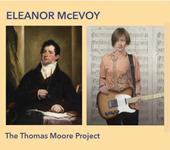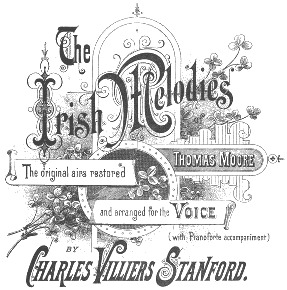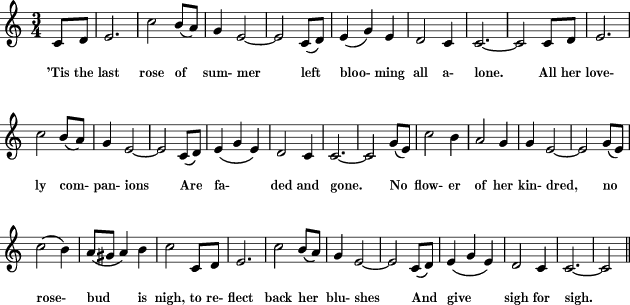FolkWorld #64 11/2017
The Thomas Moore Project
Thomas Moore (28 May 1779 – 25 February 1852) was an Irish poet, singer, songwriter, and entertainer, now best remembered for the lyrics of "The Minstrel Boy" and "The Last Rose of Summer". He was responsible, with John Murray, for burning Lord Byron's memoirs after his death. In his lifetime he was often referred to as Anacreon Moore.

Track listing:
1. Oft In The Stilly Night
2. The Last Rose of Summer
3. Come Send Round the Wine
4. Though Humble the Banquet
5. At the Mid Hour of Night
6. The Minstrel Boy
7. Believe Me, If All Those Endearing Young Charms
8. The Song of Fionnuala (Silent Oh Moyle)
9. Erin, The Tear And The Smile in Thine Eyes
10. Oh! Breathe Not His Name
11. The Harp That Once Through Tara's Halls
Eleanor McEvoy "The Thomas Moore Project", Mosco Discs, 2017
From a relatively early age Moore showed an interest in music and other performing arts. He sometimes appeared in musical plays with his friends, such as The Poor Soldier by John O'Keeffe (music by William Shield), and at one point had ambitions to become an actor. Moore attended several Dublin schools including Samuel Whyte's English Grammar School in Grafton Street where he learned the English accent with which he spoke for the rest of his life. In 1795 he graduated from Trinity College, which had recently allowed entry to Catholic students, in an effort to fulfill his mother's dream of him becoming a lawyer. Moore was initially a good student, but he later put less effort into his studies. His time at Trinity came amidst the ongoing turmoil following the French Revolution, and a number of his fellow students such as Robert Emmet were supporters of the United Irishmen movement, although Moore himself never was a member. This movement sought support from the French government to launch a revolution in Ireland. In 1798 a rebellion broke out followed by a French invasion, neither of which succeeded.
Besides Emmet, another formative influence was Edward Hudson, also a fellow student at Trinity College, who played a crucial role in introducing Moore to Edward Bunting's A General Collection of the Ancient Irish Music (1797), later one of the main sources of his own collection of Irish Melodies.
Early life
Thomas Moore was born at 12 Aungier Street in Dublin, Ireland, over his father's grocery shop, his father being from the Kerry Gaeltacht and his mother, Anastasia Codd, from Wexford. He had two younger sisters, Kate and Ellen.
From a relatively early age Moore showed an interest in music and other performing arts. He sometimes appeared in musical plays with his friends, such as The Poor Soldier by John O'Keeffe (music by William Shield), and at one point had ambitions to become an actor. Moore attended several Dublin schools including Samuel Whyte's English Grammar School in Grafton Street where he learned the English accent with which he spoke for the rest of his life. In 1795 he graduated from Trinity College, which had recently allowed entry to Catholic students, in an effort to fulfill his mother's dream of him becoming a lawyer. Moore was initially a good student, but he later put less effort into his studies. His time at Trinity came amidst the ongoing turmoil following the French Revolution, and a number of his fellow students such as Robert Emmett were supporters of the United Irishmen movement, although Moore himself never was a member. This movement sought support from the French government to launch a revolution in Ireland. In 1798 a rebellion broke out followed by a French invasion, neither of which succeeded.
Besides Emmet, another formative influence was Edward Johnson, also a fellow student at Trinity College, who played a crucial role in introducing Moore to Edward Bunting's A General Collection of the Ancient Irish Music (1797), later one the main sources of his own collection of Irish Melodies.
First success
In 1799 he travelled to London to study law at Middle Temple. He was an impecunious student and had difficulties in paying the fees and his tailor's bills. He was helped in this by his friends in the expatriate Irish community in London, including Barbara, widow of Arthur Chichester, 1st Marquess of Donegall. She and her sister became his lifelong friends.
However, it was as a poet, translator, balladeer and singer that he found fame. His work soon became immensely popular and included "The Harp That Once Through Tara’s Halls", "Believe Me, if All Those Endearing Young Charms", "The Meeting of the Waters" and many other specimens from his collections of Irish Melodies. Often simply called "Moore's Melodies", they were originally published between 1808 and 1834 (see below). But Moore was far more than a balladeer. He had major success as a society figure in London, meeting the Prince of Wales on several occasions and enjoying in particular the patronage of the Irish aristocrat Lord Moira. Moore stayed repeatedly at Moira's house at Donnington Park in Leicestershire where he enjoyed the extensive library. He also collaborated with Michael Kelly and Charles Edward Horn in staging operas to his librettos in 1801 and 1811.
North America
In 1803 he was appointed registrar to the Admiralty in Bermuda. He spent around three months on the island, but he found his work very light and uninspiring. There were several other prize courts nearby and very few captured ships were brought to Bermuda leaving him little to do. Although he drew inspiration from the scenery of Bermuda he found its society limited and soon departed for Norfolk in Virginia. Because of his brief stay there, he has sometimes been treated as an unofficial poet laureate of Bermuda. His "Ode to Nea" caused something of a scandal since the language suggested a love affair and local gossip, rightly or wrongly, identified Nea with Hester Tucker, the young wife of one of his colleagues.
From Norfolk he travelled across the United States and Canada in a Grand Tour. During this visit Moore developed a deeply critical view of the United States. He particularly disliked the governing Democratic-Republican Party and the President Thomas Jefferson. While in Washington he stayed with Anthony Merry, the British ambassador, and met Jefferson briefly: the meeting had a touch of farce since the President apparently mistook Moore, an exceptionally small man, for a child. He then travelled through various American towns and cities, enjoying his time most in Philadelphia where he already had an established reputation. He then travelled northwards to British-controlled Canada, stopping at the Niagara Falls. In Montreal, he was invited to dine at the Beaver Club. At Sainte-Anne-de-Bellevue he wrote one of his most famous works, the "Canadian Boat Song". He sailed back to Britain from Nova Scotia aboard a Royal Navy ship arriving home in November 1804.
Duel and marriage
It was after this trip that he published his book Epistles, Odes, and Other Poems, which featured a paean to the historic Cohoes Falls called "Lines Written at the Cohos [sic], or Falls of the Mohawk River, among other famous verses. A repeated theme in his writing on the United States were his observations of the institution of slavery. Moore's mocking criticisms of the United States provoked outrage in America and led to a number of rebuttals. In Britain, a critical review of the work led to Moore challenging Francis Jeffrey, an editor, to a duel. They met at Chalk Farm but the duel was interrupted by the arrival of the authorities and they were arrested. Reports that Moore's opponent had been given an empty pistol continued to dog Moore and led to persistent mockery of him.
Lord Byron derisively referred to Moore's "leadless pistol" and wrote: "on examination, the balls of the pistols, like the courage of the combatants, were found to have evaporated". Moore was angered by this and sent a letter to Byron that hinted that unless the remarks were clarified Moore was prepared to fight Byron. However, Byron had left Britain to travel abroad and the letter did not reach him. When the two men eventually met each other the dispute was settled and they soon became very close friends.
Between 1808 and 1810 Moore appeared each year with the Kilkenny Players in a charitable series of performances in Kilkenny staged by a mixture of the Irish elite and professional actors. Moore appeared frequently in comic roles in plays like Sheridan's The Rivals and O'Keeffe's The Castle of Andalusia.
Moore married an actress, Elizabeth "Bessy" Dyke, younger sister of tragedienne-to-be Mary Ann Duff, in 1811, whom he had met with the Kilkenny players where she was working with her sisters. She was the daughter of an East India Company official, but was raised with her two sisters by her mother. Moore did not initially tell his parents of his marriage, possibly because his wife was an English Protestant, but more probably because his marriage to a woman without a dowry would not help his financial prospects. Moore had expensive tastes and, despite the large sums he was earning from his writing, soon got into debt, a situation which was exacerbated by the embezzlement of £6,000, then a very large sum of money, by John Goodrich, whom he had employed to deputise for him in Bermuda. Moore became liable for the £6,000, which had been illegally appropriated by Goodrich, and lost an Admiralty ruling against this.
His marriage was generally judged to be very happy, although Bessy shrank from fashionable society to such an extent that many of her husband's friends never met her (some of them jokingly doubted her very existence); those who did meet her nearly all had a high regard for her.
Irish Melodies
In the early years of his career, Moore's work was largely generic and had he died at this point he would likely not have been considered an Irish poet. From 1806 to 1807 Moore dramatically changed his style of writing and focus. Following a request by the publishers James and William Power, he wrote lyrics to a series of Irish tunes in the manner of Haydn's settings of British folksongs, with Sir John Andrew Stevenson as arranger of the music. They were originally published in ten volumes and a supplement between 1808 and 1834, the musical arrangements of the last volumes after Stevenson's death (1833) being done by Henry Bishop.
Moore became best known for these Irish Melodies, which were enormously popular, containing songs such as "The Minstrel Boy", "The Last Rose of Summer", "Believe Me If All Those Endearing Young Charms" and "Oft in the Stilly Night". Several examples of his music, such as Farewell! But Whenever You Welcome the Hour are available online.
There was never a collected volume of Moore's Melodies in his lifetime, but many appeared not long afterwards. Some of them were made by Irish composers wanting to improve the accompaniments of Stevenson, which were often considered too simple or not appropriate to the songs. Among these were arrangements by Michael William Balfe (London: Novello & Co., 1859), John William Glover (Dublin: James Duffy, 1859), Francis Robinson Jr. (Dublin: Robinson & Bussell, 1863) and John Liptrot Hatton (London: Novello & Co., 1873).
Other works
In 1811 Moore wrote M.P., a comic opera, in collaboration with Charles Edward Horn. Although it received positive reviews Moore didn't enjoy writing for the stage and decided not to work in the medium again despite being occasionally tempted. Throughout the 1810s Moore wrote a number of political satires. After originally being a devoted supporter of the Prince of Wales, he turned against him after 1811 when he became Prince Regent and was seen to embrace the Tory government in spite of his past association with the Whigs. Another major target was the Foreign Secretary Lord Castlereagh who was repeatedly lampooned in Moore's works such as Tom Crib's Memorial to Congress which parodied the Aix-la-Chapelle diplomatic conference between Britain and her Allies portraying it as a boxing match. In 1818 Moore wrote The Fudge Family in Paris, a story in which a British family travels to experience the sights of Paris; a sequel, The Fudge Family in England, followed in 1835.
Around this time Moore also began working on a biography of the playwright and politician Richard Brinsley Sheridan, whom he met numerous times, but partly due to legal reasons it was not published until 1825.
France
Exposed to the debt of £6,000 following the ruling of the Admiralty Court against him in 1819, Moore rejected numerous offers of financial aid from his friends and admirers and was forced to leave Britain. In company with Lord John Russell he went to the Continent and after a Grand Tour through France, Switzerland and Italy lived in Paris until 1822 (notably with the family of Martin de Villamil), when the debt was finally paid off partly with the help of his latest patron Lord Lansdowne and with an advance given him by his publisher Longmans.
During his travels across Europe he briefly spent time with Lord Byron in Venice: this was to be their last meeting. Byron gave Moore his memoirs with instruction to publish them after his death as a literary executor. Moore was much criticised later for allowing himself to be persuaded to destroy Byron's memoirs at the behest of Byron's family because of their damningly honest content. Moore did, however, edit and publish Letters and Journals of Lord Byron, with Notices of his Life in 1830, six years after Byron's death in Greece.
After returning to Britain, Moore published new poetry, but in spite of good reviews and good sales he was growing disillusioned with writing poetry and he began to consider writing novels, a genre made increasingly popular by the success of Walter Scott. In October 1825 Moore's Memoirs of the Life of Richard Brinsley Sheridan was finally published after nine years of work on and off. It proved very popular, went through a number of editions quickly and helped give Moore a more serious reputation among his literary contemporaries.
Later life
He finally settled in Sloperton Cottage at Bromham, Wiltshire, England, and became a novelist and biographer as well as a successful poet. Around the time of the Reform Act he was invited to stand for parliament, and considered it, but nothing came of it. In 1829 he was painted by Thomas Lawrence, one of the last works completed by the artist before his death. In 1830 he sang in front of the future Queen Victoria in a duet with her mother, and later composed the song "Sovereign Woman" in her honour.
Moore was for many years a strong advocate for Catholic Emancipation; he regarded its absence as the source of all problems in Ireland and the sole reason behind the 1798 rebellion – a point he made in his 1831 biography Life and Death of Lord Edward Fitzgerald. However, he experienced a difficult relationship with the leader of the Catholic Association Daniel O'Connell whom Moore regarded as a demagogue, believing "O'Connell and his ragamuffins have brought tarnish upon Irish patriotism". Following the passing of the Catholic Relief Act in 1829 Moore believed his involvement in politics terminated, joking to a friend: "Now that the Paddies are happy […] I consider my politics entirely at an end". However, he was drawn back into politics by a series of democratic rebellions across Europe in Belgium, France and Poland. Moore had also been a sympathiser with the Greeks in their War of Independence, a passion he shared with his friend Byron.
He received a state pension, but his personal life was dogged by tragedy including the deaths of all his five children within his lifetime (Anne, age 5, d. 1817; Anastasia Mary, age 17, d. 1829; Olivia as a baby of a few months of age; John Russell, aged 19, d. 1842; and Thomas Lansdowne, aged 27, d. 1849) and a stroke in later life, which disabled him from performances – the activity for which he was most renowned. Moore died being cared for by his wife at Sloperton on 26 February 1852. His remains are in a vault at St. Nicholas churchyard, Bromham, within view of his cottage-home, beside his daughter Anastasia.
Moore was a frequent visitor to Lord Henry Fitzgerald property at Thames Ditton, Boyle Farm, and the premises were incorporated into Moore's long poem, The Summer Fête.
Legacy
Moore is often considered Ireland's national bard and is to Ireland what Robert Burns is to Scotland. Moore is commemorated in several places: by a plaque on the house where he was born, by busts at The Meetings and Central Park, New York, and by a bronze statue near Trinity College Dublin. There is a road in Walkinstown, Dublin, named Thomas Moore Road, in a series of roads named after famous composers, locally referred to as the Musical Roads.
- Many composers have set the poems of Thomas Moore to music. They include Gaspare Spontini, Robert Schumann, Hector Berlioz, Charles Ives, William Bolcom, Lori Laitman, Benjamin Britten and Henri Duparc.
- The song "Believe Me If All Those Endearing Young Charms" is often used in a famous gag in a number of Warner Brothers cartoons, usually involving a piano or Xylophone rigged to explode when a certain note is played. The hero, typically Bugs Bunny, tries to play the melody line of the song, but always misses the rigged note (C above middle C). The villain or rival, finally exasperated, pushes the hero aside and plays the song himself, striking the correct note and blowing himself up. In one instance, however, the protagonist plays the melody on a xylophone and, upon striking the rigged note, the antagonist explodes in an "old gag, new twist."
- Many songs of Thomas Moore are cited in works of James Joyce, for example "Silent, O Moyle" in Two Gallants (Dubliners) or "The Last Rose of Summer".
- Oliver Onions quotes Moore's poem "Oft in the Stilly Night" in his 1910 ghost story "The Cigarette Case".

From Wikipedia, the free encyclopedia
[en.wikipedia.org/wiki/Thomas_Moore].
Wikipedia® is a registered trademark of the Wikimedia Foundation, Inc., a non-profit organization.
Text is available under the Creative Commons Attribution-ShareAlike License.
Date: October 2017.
'Tis the Last Rose of Summer
|
|
'Tis the Last Rose of Summer
'Tis the last rose of summer
Left blooming alone;
All her lovely companions
Are faded and gone;
No flower of her kindred,
No rose-bud is nigh,
To reflect back her blushes,
Or give sigh for sigh.
I'll not leave thee, thou lone one!
To pine on the stem;
Since the lovely are sleeping.
Go, sleep thou with them.
Thus kindly I scatter
Thy leaves o'er the bed,
Where thy mates of the garden
Lie scentless and dead.
So soon may I follow,
When friendships decay,
And from Love's shining circle
The gems drop away.
When true hearts lie withered,
And fond ones are flown,
Oh! who would inhabit
This bleak world alone?
|
Photo Credits:
(1),(2),(5) Eleanor McEvoy
(by Shane McCarthy);
(3) Ronan Kelly: Bard of Erin - The Life of Thomas Moore,
(4) Thomas Moore: Irish Melodies,
(5) 'The Last Rose of Summer'
(unknown).
FolkWorld - Home of European Music
 Layout & Idea of FolkWorld © The Mollis - Editors of FolkWorld
Layout & Idea of FolkWorld © The Mollis - Editors of FolkWorld






